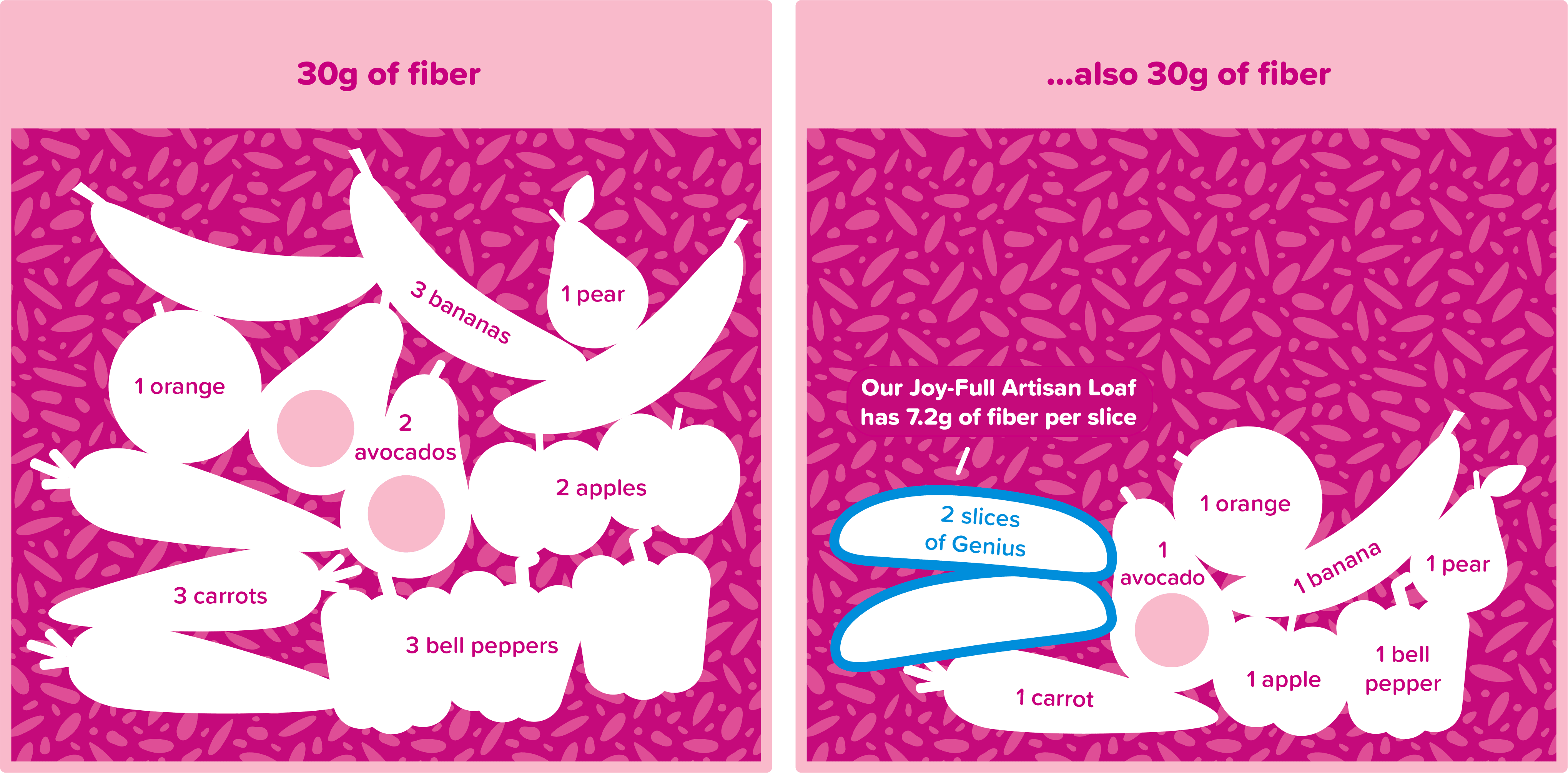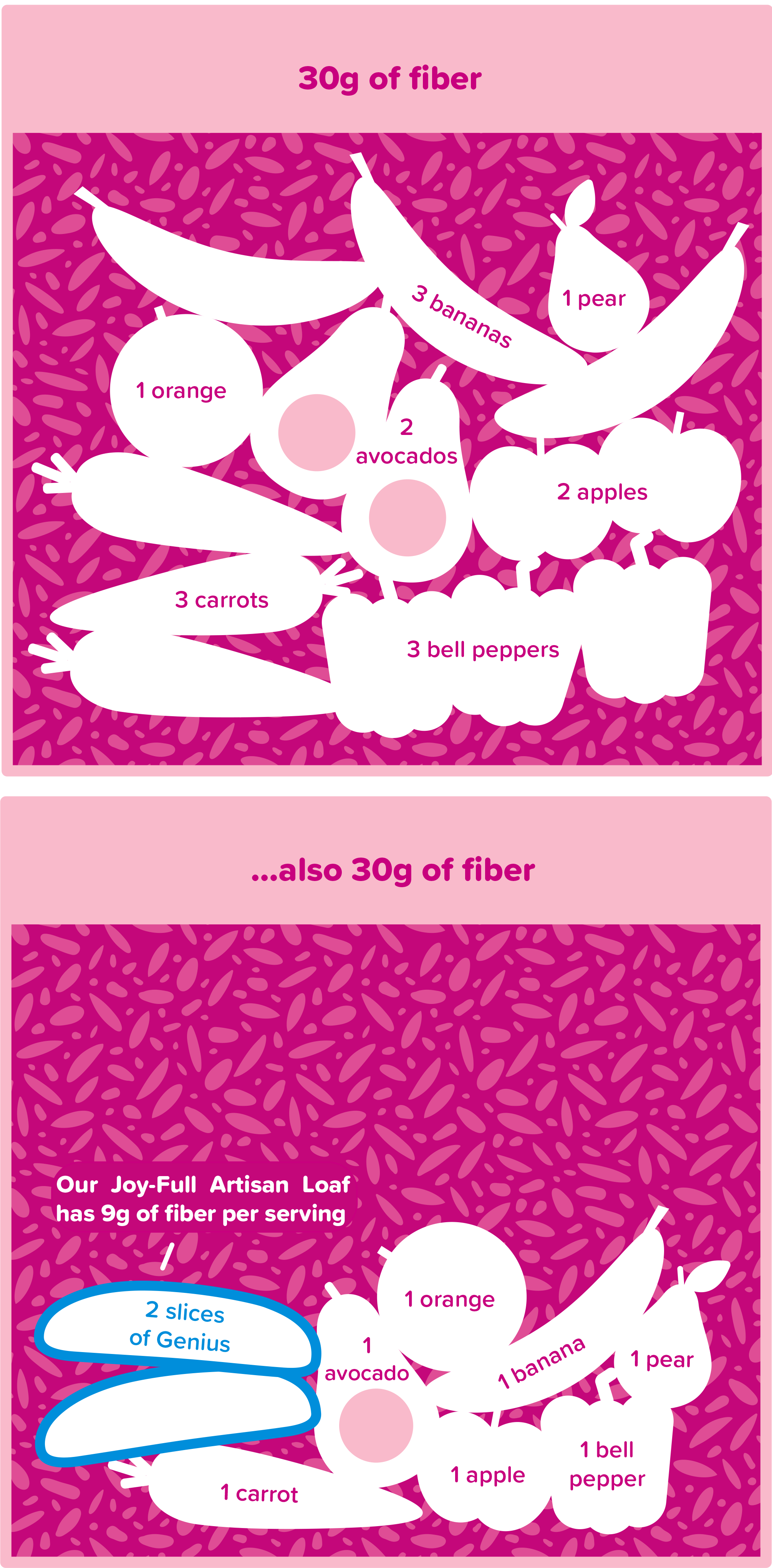Lately the whole world has taken an interest in high fibre diets – with the World Health Organisation demonstrating that most of us aren’t getting enough of it every day. Tracking your daily fibre intake can help you check how gut lovin’ your diet really is, and the potential this can have on your overall health is very exciting. At Genius we love innovating with the best fibre packed gluten free foods so that you can eat more of it easily. Fibre has so many important functions in the body and the different types all have various roles to play. Not only that but there are so many truly delicious ways to include fibre in your diet throughout the day, proving that it’s a whole lot simpler than you might think.
What are the benefits of eating high fibre foods then?
Benefits of high fibre foods are being revealed all the time. It ranges from its role in keeping our bowels healthy (and helping us to go to the toilet more!) to understanding the impact it can have on protecting our long-term health. A recent report looking at over 150 studies found our risk of developing cardiovascular disease (including heart attack and stroke), colorectal cancer and type 2 diabetes was significantly reduced by eating a high fibre diet. Wow.
There are more exciting developments showing the potential a high fibre diet has to keep gut bacteria thriving. Did you know, these bacteria hold the key to many aspects of our health? For example the likelihood of developing anxiety or depression has been linked to gut health. People diagnosed with depression sometimes don’t have the right mix or quantity of bacteria in their guts and when this is altered, it seems that for some, their happiness scores do improve.
How much fibre do I need in a day?
When researchers looked at all the studies investigating high fibre foods and their impact on health, they found that eating around 30g of fibre per day can have significant health benefits. It’s obvious that this is a challenge, as currently men are only eating 50% of this guideline, and women even less at just 25%. It may sound like everyone needs a complete fibre diet overhaul but we are here to take you on this high fibre journey one simple step at a time. Buckle up!


This daily recommendation sounds a stretch but is 100% doable, it really is! Our gut lovin’ range is a tasty way to boost your fibre intake with more fibre per mouthful than standard breads, rolls and wraps. There are also plenty of other options on the shelves so let’s take a look at what foods are high in fibre.
So what foods are high in fibre?
- Lentils, beans and peas
- Fruit and vegetables (especially with their delicious skins on)
- Nuts and seeds
- Foods with added fibre, for example yogurt or bread
- Wholegrains (when the whole grain is used – not just a part of it) – Gluten Free Wholegrains include Quinoa, Wild Rice, Buckwheat & Sorghum.
If we are all going to successfully boost our daily fibre intake, we need easy and practical ways to do so. At Genius we use Active Cultures and prebiotic fibres in our gut lovin’ range so staples such as bread and rolls can provide even more sources of fibre in a totally scrumptious way, without having to eat loads more food!
How else can I eat a high fibre diet the easy way?
So, taking into account what foods are high in fibre we can create a few fibre ‘foundations’ that will really help to increase your daily fibre intake:
Every Single Meal
Make high fibre sides a part of each meal. A balanced meal should consist of some carbohydrate (starchy food), protein (meat, fish or plant-based) and vegetables. If the starchy foods are a source of fibre, then this really helps. These include gluten free bread, soba noodles, skin-on potatoes, wholegrain pasta or pasta made from veggies like chickpea or lentil.
5 a day
We’ve all heard that we should hit 5 fruits & veg a day, but experts believe we would all benefit from eating even more than this. Have a think about how you can include different fruit and veggies into meals and snacks and check out our recipes for more inspiration.
Snack Right
Snack on high fibre foods like wholegrains, pulses, nuts or seeds as well as fruit and vegetables. Placing a fruit bowl within easy reach can help!
Gluten Free? No Problem
Cereals and cereal products are our biggest fibre provider, making up around 40% of our daily fibre intake. Providing healthy, tasty gluten-free options is at the heart of everything we do at Genius to boost your daily fibre intake with ease.
Simple Swaps
None of us really have time to count up how much fibre we’re eating in a day, so making sensible swaps on a regular basis and creating some good habits is the key to ensuring there are always sources of fibre in our diets. With handy simple swaps like these, you’ll be on your way to a high fibre diet in no time. Amazing!
What things do I need to consider when increasing my daily fibre intake?
Don’t try to go all the way to 30g on day one! Increase your fibre gradually, ideally over the course of a month. When eating more high fibre foods, the bowel motions you produce are likely to get a little bulkier. Don’t worry, this is a good thing! But you should drink plenty of water as this will help things through your bowel more easily to avoid short-term constipation. Guzzle that water!
What about fibre supplements?
Fibre Supplements can be helpful but will generally only contain one lonely type of fibre. Food on the other hand contains multiple types and variety is what keeps our gut bacteria thriving.
Should I be worried about incorporating more high fibre foods?
Fibre is found in many carbohydrate foods so some people worry that increasing their daily fibre intake will have a negative impact on their body weight. Interestingly, some studies have shown that the opposite is true as diets rich in fibre are associated with weight loss. This is because fibre keeps us feeling full and helps to regulate our blood sugar levels across the day.
Hopefully now a high fibre diet feels achievable and tasty too!
